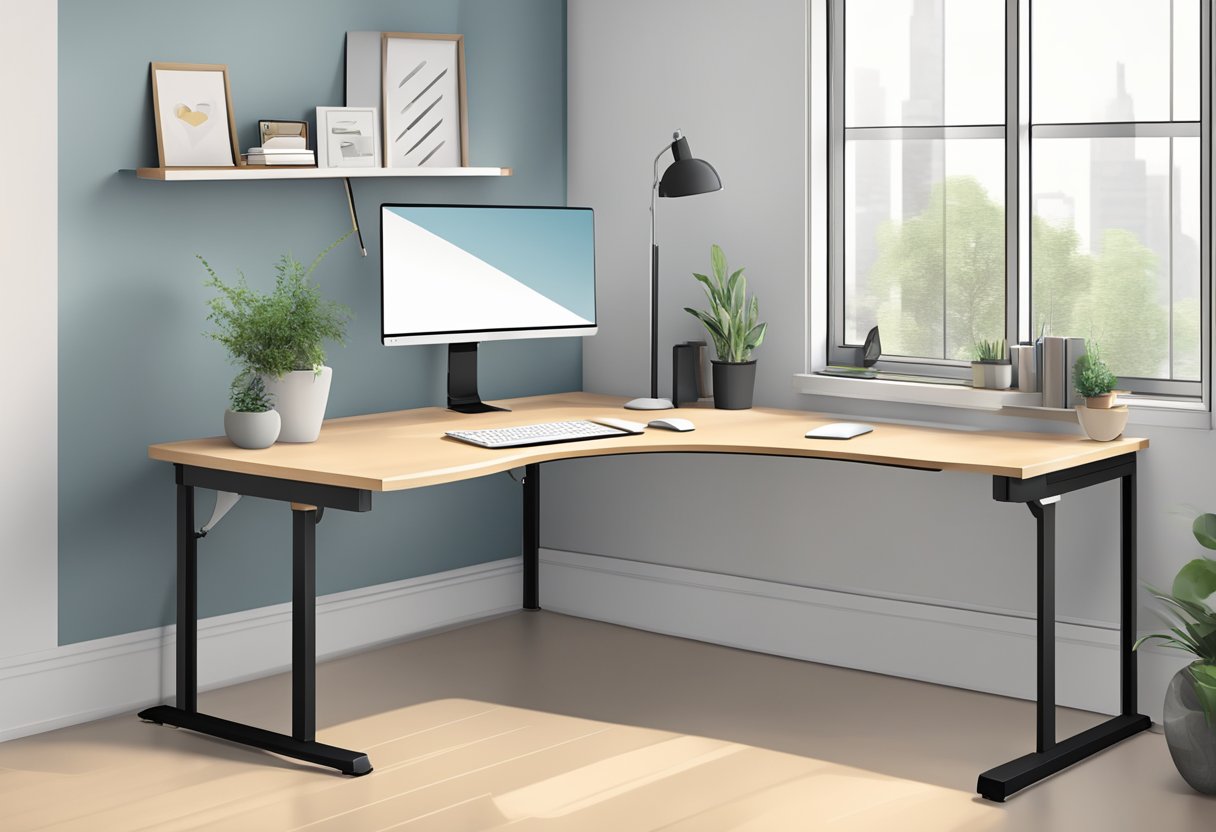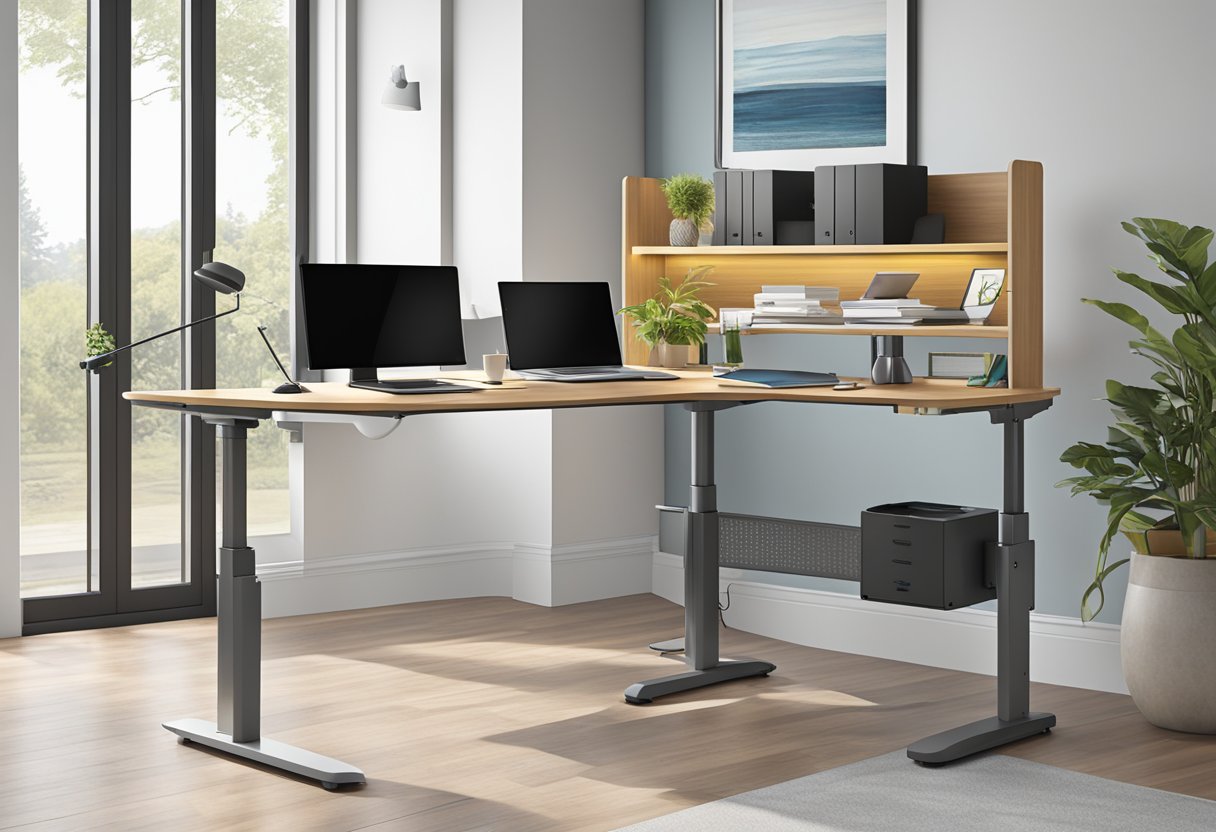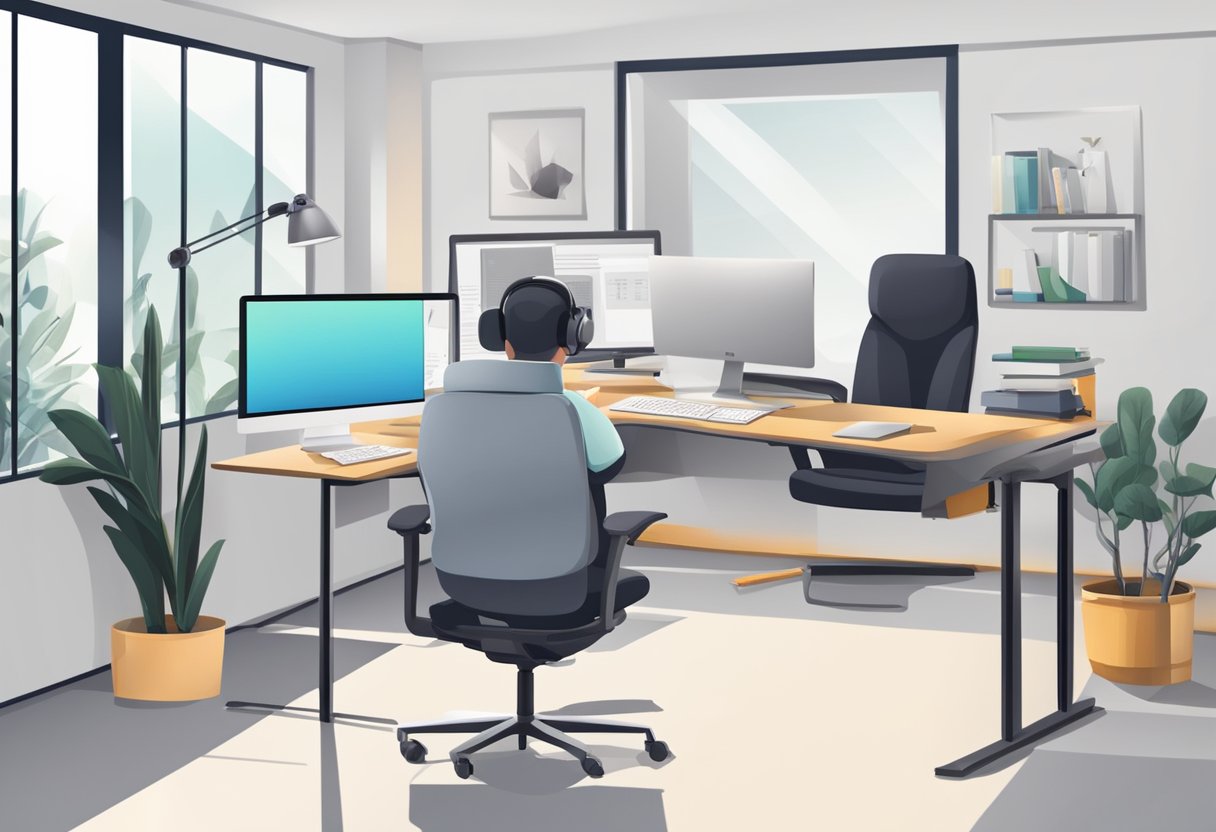- You are here:
- Home »
- Desk Comparisons »
- Are Corner Desks More Ergonomic? A Comprehensive Analysis
Are Corner Desks More Ergonomic? A Comprehensive Analysis
As an Amazon Associate I earn from qualifying purchases.
If you spend a lot of time sitting at a desk, you know how important it is to have a comfortable and ergonomic workspace. One popular option for office furniture is the corner desk, which can offer a variety of benefits over traditional desks. But are corner desks really more ergonomic, or is this just a myth?

Understanding Ergonomics and Corner Desks
Before we dive into whether or not corner desks are more ergonomic, it’s important to understand what ergonomics means. Ergonomics is the study of how people interact with their environment and the tools they use, with the goal of optimizing comfort, safety, and efficiency. When it comes to office furniture, ergonomic design aims to reduce strain on the body, particularly in areas like the neck, shoulders, back, and wrists.
Benefits of Corner Desks
Corner desks offer several potential ergonomic benefits. First, they can help you optimize your workspace by taking advantage of the corners of a room, which are often underutilized. This can give you more surface area to work with, as well as more storage space. Additionally, corner desks can help you position your computer monitor in a way that reduces neck and eye strain, since they often allow for a wider viewing angle.
Key Takeaways
- Corner desks can offer several ergonomic benefits, including more workspace and better monitor positioning.
- When choosing a corner desk, consider factors like size, shape, and adjustability.
- Remember that no single desk will work for everyone, so it’s important to find the option that works best for you.
Understanding Ergonomics and Corner Desks
https://www.youtube.com/watch?v=IUM-2cvJYHY&embed=true
When it comes to creating a comfortable and ergonomic workspace, choosing the right desk is crucial. Corner desks have gained popularity in recent years, with many people wondering if they are more ergonomic than traditional straight desks. In this section, we will explore the benefits and drawbacks of using a corner desk and how it affects your posture and comfort while working.
Ergonomics is the science of designing equipment and furniture that fits the human body’s natural movements and postures. An ergonomic desk is designed to promote good posture, reduce strain on your muscles and joints, and improve your overall comfort while working. Corner desks are designed to fit snugly into the corner of a room, providing ample workspace while taking up minimal floor space.
One of the most significant benefits of using a corner desk is that it allows you to position your computer monitor at the optimal distance and height for comfortable viewing. With a corner desk, you can position your monitor at a comfortable distance from your eyes, reducing eye strain and neck pain. Additionally, you can adjust the desk height to ensure that your arms and wrists are at a comfortable angle while typing.
Another advantage of using a corner desk is that it provides ample workspace, allowing you to spread out your work materials and keep everything organized. This is especially useful if you work with multiple monitors or need to keep several documents open at once.
However, there are some drawbacks to using a corner desk. For example, if you are left-handed, you may find it challenging to use a right-handed corner desk. Additionally, if you need to access your desk from both sides, a corner desk may not be the best option.
To ensure that you get the most out of your corner desk, it’s essential to pair it with an ergonomic chair and a laptop stand if you use a laptop. This will help you maintain good posture and reduce strain on your muscles and joints while working.
In conclusion, corner desks can be more ergonomic than traditional straight desks, but it depends on your specific needs and work habits. If you have limited floor space and need ample workspace, a corner desk may be the perfect solution for you. However, if you need to access your desk from both sides or are left-handed, a straight desk may be a better option.
Benefits of Corner Desks
https://www.youtube.com/watch?v=un__qz-w9OU&embed=true
When it comes to choosing a desk for your workspace, corner desks can provide a variety of benefits. Here are some of the advantages of using a corner desk:
1. Space-saving
Corner desks are a great option for those who have limited space in their home office or workspace. They can be tucked into a corner, leaving more floor space for other furniture or equipment. This can be especially helpful in small apartments or rooms.
2. Increased productivity
Corner desks can help increase productivity by providing a dedicated workspace that is free from distractions. When you have a designated area for work, it can help you focus and stay on task. Additionally, corner desks can often provide more surface area for your work, allowing you to spread out and organize your materials.
3. Ergonomic design
Corner desks can be more ergonomic than traditional desks because they allow you to position your computer and other equipment within reach, reducing the need to strain or twist your neck or back. Some corner desks also come with a sit-stand feature, allowing you to adjust the height of your desk throughout the day and promote better posture.
4. Storage options
Many corner desks come with built-in storage options, such as shelves or drawers, which can help you keep your workspace organized and free from clutter. This can also help you save time by keeping your materials within reach and easily accessible.
Overall, corner desks can be a great option for those looking to maximize their workspace while promoting comfort and productivity. With a variety of options available, you can find a corner desk that meets your specific needs and preferences.
Considerations for Choosing a Corner Desk

When choosing a corner desk, there are several factors to consider to ensure that it is ergonomic and suitable for your needs. Here are some considerations to keep in mind:
Desk Size and Shape
The size and shape of the desk are crucial factors to consider. A corner desk is an excellent option for those who need a lot of workspace but have limited floor space. However, it is essential to measure the area where you plan to place the desk to ensure that it fits comfortably. You should also consider the size of your monitor and other accessories to ensure that they fit comfortably on the desk.
Monitor Placement
The placement of your monitor is crucial to prevent eye strain and neck pain. The top of your monitor should be at or slightly below eye level, and the screen should be directly in front of you. Consider using a monitor arm or stand to adjust the height and angle of your monitor.
Sitting and Standing
Sitting for extended periods can lead to back pain and other health issues. Consider using a desk that allows you to switch between sitting and standing throughout the day. A corner standing desk or an adjustable desk can help you transition between sitting and standing with ease.
Keyboard and Mouse Placement
The placement of your keyboard and mouse is also essential for ergonomic comfort. Your keyboard should be at a height that allows your arms to rest comfortably at your sides, and your mouse should be close to your keyboard. Consider using a keyboard tray or an ergonomic keyboard to improve your posture and reduce strain on your wrists.
Assembly and Accessories
Consider the ease of assembly and the availability of accessories when choosing a corner desk. Some desks may require more assembly than others, and some may come with built-in USB ports or other features that can enhance your productivity.
Price and Value
Finally, consider the price and value of the desk. While a high-end desk may have more features and a higher weight capacity, it may not be necessary for your needs. Consider your budget and the features that are most important to you when choosing a corner desk.
By considering these factors, you can choose a corner desk that is ergonomic, comfortable, and suitable for your needs.
Frequently Asked Questions

What are the ergonomic benefits of corner desks?
Corner desks offer several ergonomic benefits. They provide ample workspace while saving floor space, allowing you to place the desk in a corner and maximize the available area. This helps reduce clutter and makes it easier to organize your work area. Additionally, corner desks often come with adjustable height and tilt features, allowing you to customize the desk to your specific needs and preferences. This can help reduce strain on your neck, shoulders, and back.
What is the ideal ergonomic setup for a corner desk?
To achieve an ideal ergonomic setup for a corner desk, you should ensure that the desk is at the appropriate height and angle. Your arms should rest comfortably on the desk, with your elbows at a 90-degree angle. Your monitor should be at eye level, and your keyboard should be positioned at a comfortable distance from your body. Additionally, you should ensure that your chair provides adequate lumbar support and is at the appropriate height.
Can corner desks improve posture and reduce pain?
Yes, corner desks can help improve posture and reduce pain. By providing ample workspace and adjustable features, corner desks allow you to customize your work area to your specific needs and preferences. This can help reduce strain on your neck, shoulders, and back, which can lead to improved posture and reduced pain.
Are there any ergonomic disadvantages to corner desks?
While corner desks offer several ergonomic benefits, they may not be suitable for everyone. Some people may find that the corner design limits their movement or makes it difficult to access certain areas of the desk. Additionally, some corner desks may not be adjustable, which can limit their ergonomic benefits.
How do corner desks compare to traditional desks in terms of ergonomics?
Corner desks generally offer more ergonomic benefits than traditional desks. They provide ample workspace while saving floor space, allowing you to customize your work area to your specific needs and preferences. Additionally, many corner desks come with adjustable features, which can help reduce strain on your neck, shoulders, and back.
Are there any studies on the ergonomic benefits of corner desks?
Yes, several studies have been conducted on the ergonomic benefits of corner desks. These studies have found that corner desks can help improve posture, reduce pain, and increase productivity. However, it is important to note that the results of these studies may vary depending on the specific design and features of the corner desk.
Amazon and the Amazon logo are trademarks of Amazon.com, Inc, or its affiliates.
Related Posts
03 Dec, 2023How to Organize Papers Without a Filing Cabinet: Simple Tips and Tricks
03 Dec, 2023Does a Corner Desk Have to Be in a Corner? Exploring the Placement Options
21 Nov, 2023L-Shaped Desk vs Straight Desk: Which is the Better Choice for Your Workspace?
21 Nov, 2023L Shaped Desk vs Corner Desk: Which is the Best for Your Workspace?
21 Nov, 2023Corner Desk vs Straight Desk: Which is the Better Option for Your Workspace?
